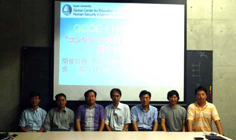Events
Research Workshop on Fire Resistance of Conference Materials and Constructions
Date: August 18, 2009
Venue: Seminar Room 413 (C2), Katsura Campus, Kyoto University, Japan
Organized by:
Kyoto University Global COE Program "Global Center for Education and Research on Human Security Engineering for Asian Megacities"
Number of attendants: 7
Program
Report 059
Outline
In this workshop, research information is exchanged on fire resistance of concrete materials and structures between researchers with different academic background. The possibility of collaboration in the future was to be discussed and agreed.
Report
In the symposium, research information is presented by five speakers followed by discussions.
At first, Prof. Nishiyama (Dept. of Architecture and Architectural Eng.) presented a framework for fire resistance design of pre-stressed concrete beams. Using the experimental results of full-scale beam element, the design method for ultimate strength as well as residual deformation. Corresponding research needs were pointed out. Next, Mr. Seongjun (Doctoral Student, Dept. of Architecture and Architectural. Eng.) presented his research results on temperature dependence of strength and elastic modulus of pre-stressing tendons and on the high temperature creep behavior. As to the thermal response of element, Mr. WU Chung Hao (Doctoral Student, Dept. of Civil Eng., National Chung Hsing University, Taiwan), is carrying out numerical simulations using a finite element code developed by Kyoto University. His state-of-the-art report was presented. It was agreed that the thermal analysis on various cross sectional shape is to be continued to propose simplified design formula for calculating temperature profile in practice.
As to the high-strength concrete, it is known that intense surface delaminating takes place up to deep into core concrete. This phenomenon is called thermal spalling. Prof. Kwon Young-Jin (Dept. of Fire Protection Engineering, Hoseo University, Korea, Invited foreign scholar through JSPS fellowship program) presented examples on fire damage on concrete buildings and the state-of-the-art of the countermeasures to mitigate thermal spalling. It was demonstrated that the consideration on material properties in line with concrete engineering is important to understand the mechanism of spalling. Assoc. Prof. Kazunori Harada (Dept. of Architecture and Architectural. Eng.) presented analytical results of hygrothermal and mechanical modeling of concrete materials. A hypothesis was proposed to explain the reason of thermal spalling.
As a summary of discussion, it is suggested that introduction of material science and mechanical modeling into existing calculation mode would be promising. This point is further discussed and agreed to work together on this topic. The two listeners also welcomed to make exchange information and collaboration in line with corresponding research projects.
As reported above, the seminar had small number of participants, however, all the participants could discuss deeply on one topic. The seminar was very successful in making progress of research collaboration among the participants.

